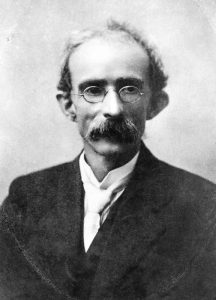Thomas Clarke (1858-1916) – Irish Republican Brotherhood, Irish Volunteers, Leader

Thomas James Clarke was born in Hurst Castle, Isle of Wight, England, in 1858. His father was a soldier, and the family moved frequently throughout Clarke’s childhood. Clarke grew up in a military family and was educated in England before moving to the United States as a young man.
In America, Clarke became involved in the Irish nationalist movement, eventually joining the Clan na Gael, an Irish republican organization that advocated for Irish independence from British rule. Clarke became a prominent member of the organization and was eventually appointed as one of the “executive board” members responsible for the group’s operations.
Clarke was involved in many of the Clan na Gael’s activities, including the plan to rescue six Irish nationalists from a British prison in Australia, known as the Catalpa rescue. He also played a prominent role in the funeral of Irish revolutionary Jeremiah O’Donovan Rossa in 1915, which was seen as a major propaganda victory for the Irish nationalist cause.
Clarke returned to Ireland in 1907 and became heavily involved in the Irish nationalist movement there. He was a founding member of the Irish Republican Brotherhood (IRB), an underground organization dedicated to Irish independence, and helped to plan the Easter Rising of 1916, which aimed to establish an independent Irish republic.
During the Easter Rising, Clarke was in command of the General Post Office (GPO), which was the headquarters of the Irish Republican Army (IRA) during the uprising. Clarke was one of the seven signatories of the Proclamation of the Irish Republic, which declared Ireland’s independence from British rule.
Clarke was subsequently sentenced to death for his role in the Easter Rising and was executed by firing squad on May 3, 1916. His execution, along with those of the other leaders of the Rising, is widely seen as a turning point in Irish history and helped to inspire a renewed push for Irish independence.
Clarke was survived by his wife, Kathleen Daly Clarke, who was also involved in the Irish nationalist movement and was herself imprisoned for her role in the Easter Rising. The couple had three children.
Thomas Clarke’s legacy as a key figure in the Irish nationalist movement is widely recognized. He is remembered as a dedicated revolutionary who gave his life for the cause of Irish independence.